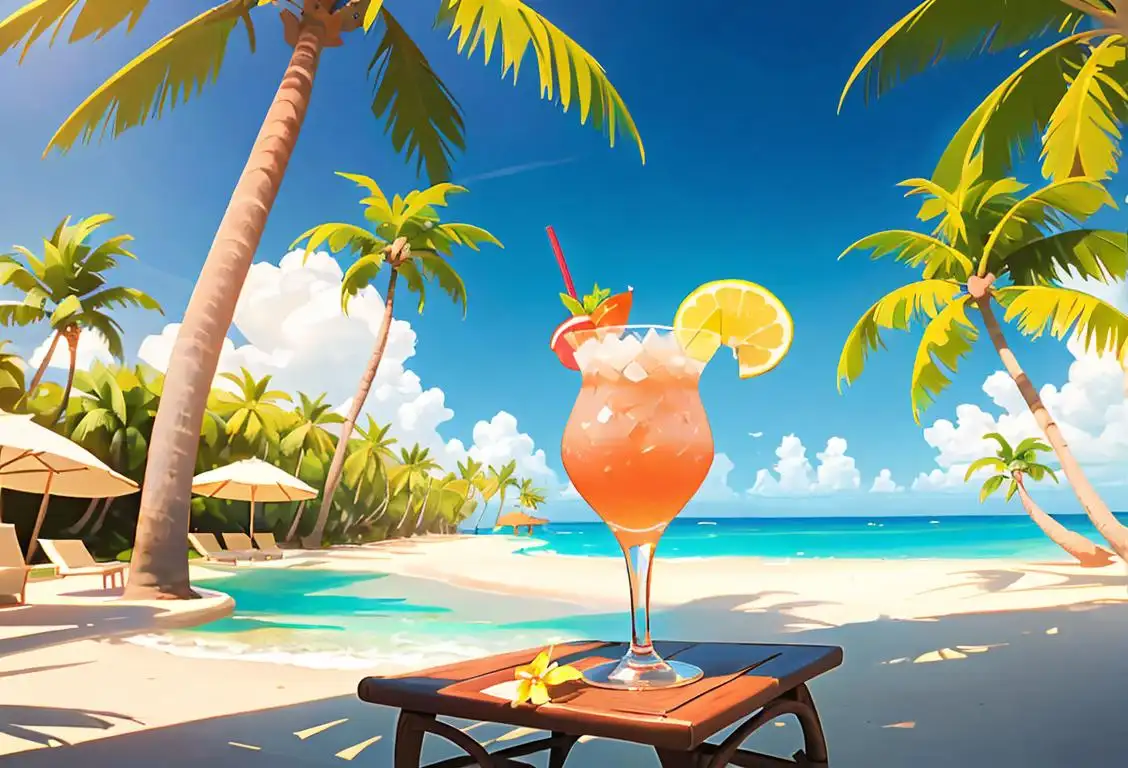National Rum Day

Ahoy, matey! Ready to dip your toes into the sea of Internet history for National Rum Day? Yeah, we thought so. Brace yourself for a swashbuckling journey through the world of good ol' grog.
When is Rum Day?
It's national rum day on the 16th August.
A Jolly Good History
National Rum Day is a day for lovers of pirates, punch, and pina coladas. On August 16, people around the world celebrate this molasses-based bottled magic. Our team at WhatNationalDayIsIt.com went through our internet archives and found a whopping 19214 mentions of National Rum Day! By our calculations, the most notable rumble (see what we did there?) happened on August 16th, 2016. Barely a fortnight since Pokemon Go had us all wandering aimlessly into oncoming traffic, the internet had something new to unite us: National Rum Day.
Spreading the Rum Love
Posts about National Rum Day were scattered across the web like the lost pieces of Captain Jack Sparrow's cursed Aztec Gold. Facebook, Instagram, Twitter - you name it! One cannot simply ignore the allure of this beloved potion, the perfect liquid partner to a zesty slice of lime or a smooth, buttery colada. Hashtag '#NationalRumDay' began trending, bringing the world together in a mutual love of the sweet, smooth, often-times spicy, spirit!
2016 – A Year of High Spirits
But the real treasure isn't in how many times we, as a worldwide web of rum enthusiasts, mentioned National Rum Day. Rather, it's the shared laughter, anticipation, and delight seen in the conversations, comments, and emojis surrounding National Rum Day! People shared memories, cocktail recipes, and posts about enjoying a dram or two. Whether it's a dark spiced Caribbean run or a white and crisp variant straight from Bermuda, the spirit of the day transcends beyond rum itself. So let's clink glasses to National Rum Day!
History behind the term 'Rum'
1650
The origins of rum
Rum is believed to have originated in the Caribbean in the mid-17th century. The first documented mention of this spirit dates back to 1650, when rum was produced on sugarcane plantations. It was a byproduct of the sugar refining process, specifically the molasses leftover after boiling sugarcane juice.
1730
The West Indies trade
During the early 18th century, rum production in the Caribbean saw significant growth due to the flourishing sugar industry. The demand for rum surged, and it became an essential commodity for the West Indies trade. The British Navy also started to provide rum rations to their sailors as a means to boost morale.
1760
American Revolution and rum
Rum played a vital role in the American Revolution, fueling both the patriots and the British troops. The British heavily taxed molasses and rum imported to the American colonies, leading to anger and resentment among the colonists. This taxation became one of the key grievances that contributed to the revolution.
1820
Distillation advancements
In the early 19th century, there were significant advancements in distillation techniques, allowing for the production of higher quality and more refined rums. Continuous column stills replaced traditional pot stills, making the rum production process more efficient and consistent.
1862
The establishment of Bacardi
In 1862, Don Facundo Bacardí Massó established the Bacardi rum distillery in Cuba. He revolutionized rum production by employing charcoal filtration and aging techniques, resulting in a smoother and more palatable rum. Bacardi soon became one of the most renowned rum brands in the world.
1920
Prohibition and rum-running
During the Prohibition era in the United States from 1920 to 1933, the production, sale, and distribution of alcoholic beverages were banned. However, this didn't stop the American public from consuming alcohol. Rum became a popular choice, and the illegal transportation of rum from the Caribbean to the United States gave rise to the notorious practice of rum-running.
1944
Rum's protected geographical indication
In 1944, the West Indies rum distillers established a protected geographical indication (PGI) for Caribbean rums. This designation ensures that rums produced in the Caribbean adhere to specific quality standards and traditional production methods, protecting the authenticity and reputation of Caribbean rum.
Did you know?
Did you know, rum was the first spirit to be produced for entertainment purposes? Prior to this, spirits were principally made for medicinal purposes (talk about a fun prescription!).Tagged
fun community celebration holiday drinks rum spiritsFirst identified
26th April 2015Most mentioned on
16th August 2016Total mentions
19214Other days
Rum Day
Pepperoni Pizza Day
Vodka Day
Scotch Day
Law Day
Chocolate Ice Cream Day
Thank A Police Officer Day
Cognac Day
Cheese Pizza Day
Brothers And Sisters Day








